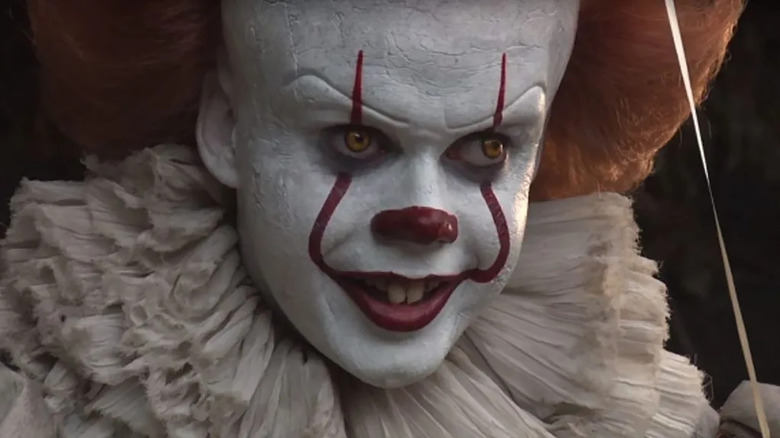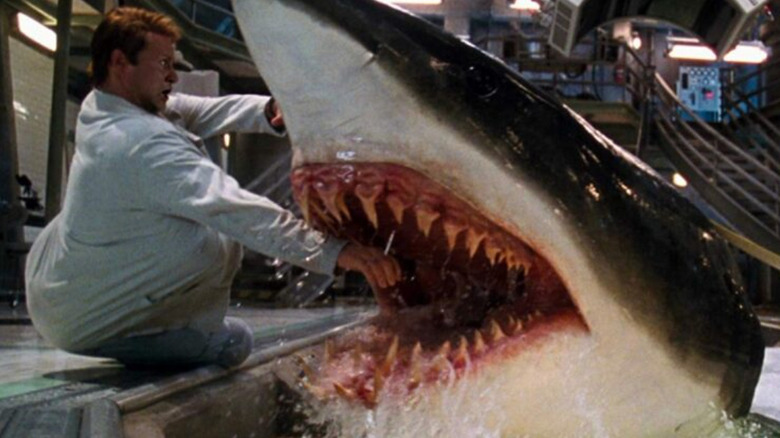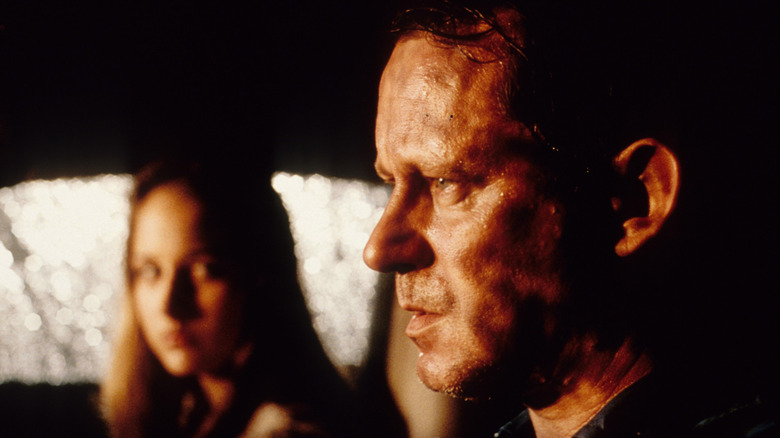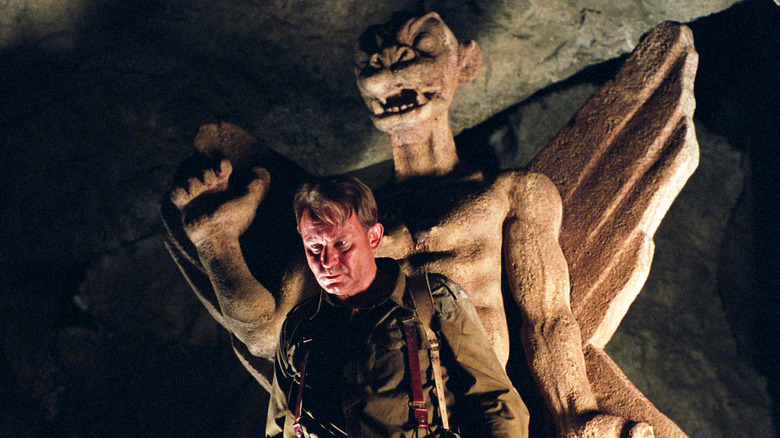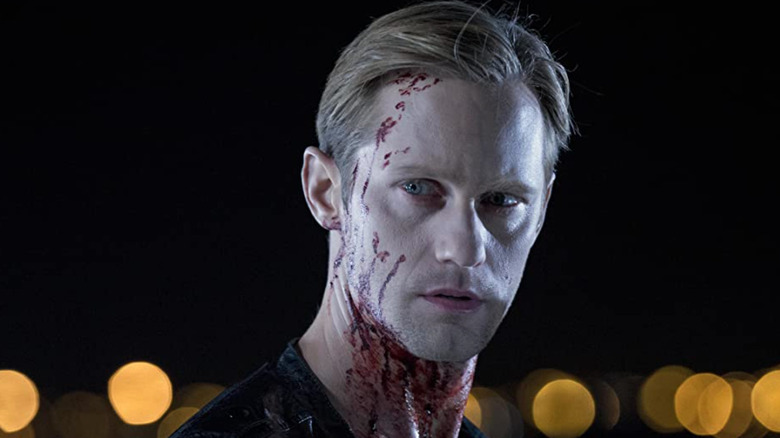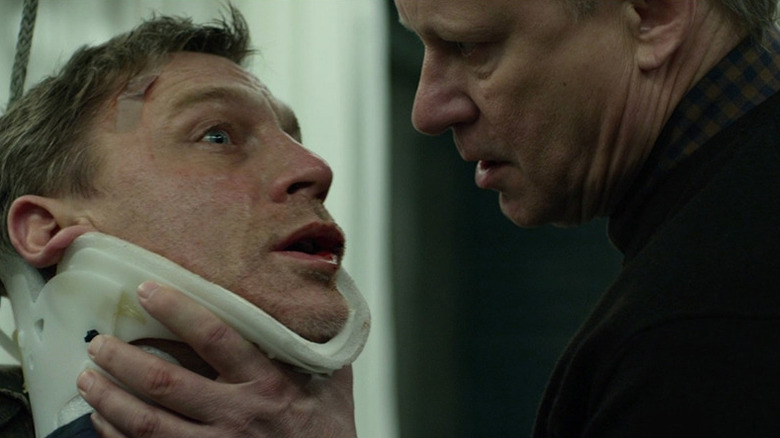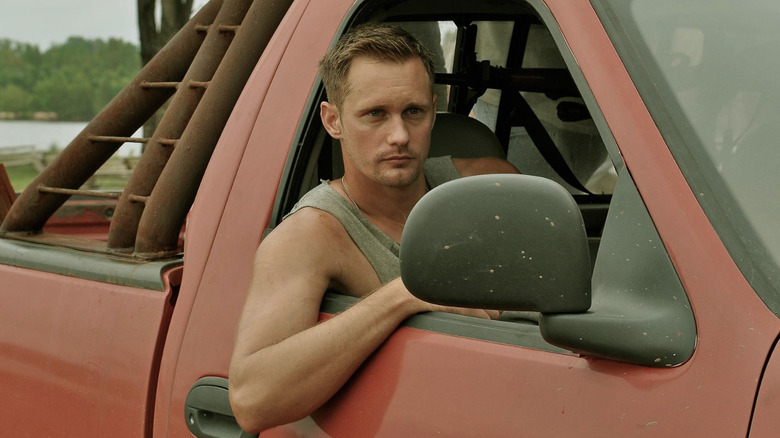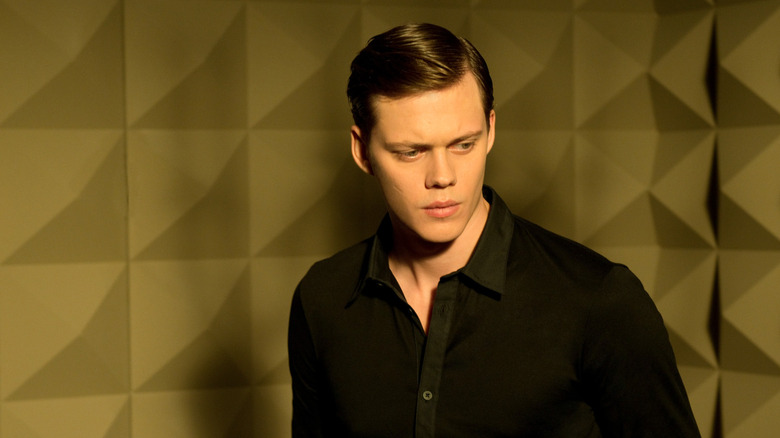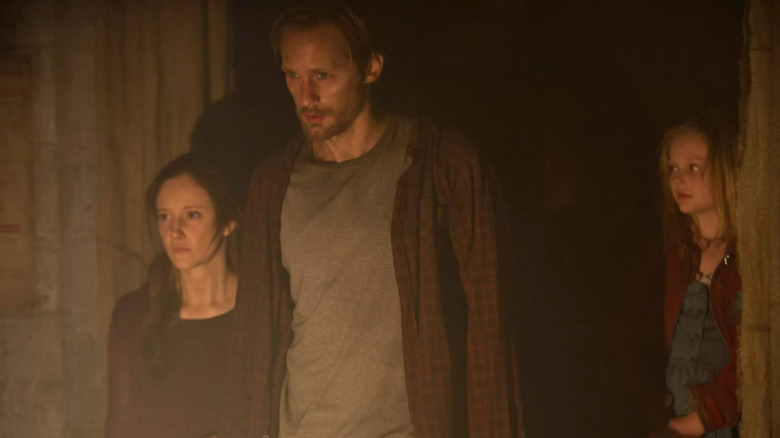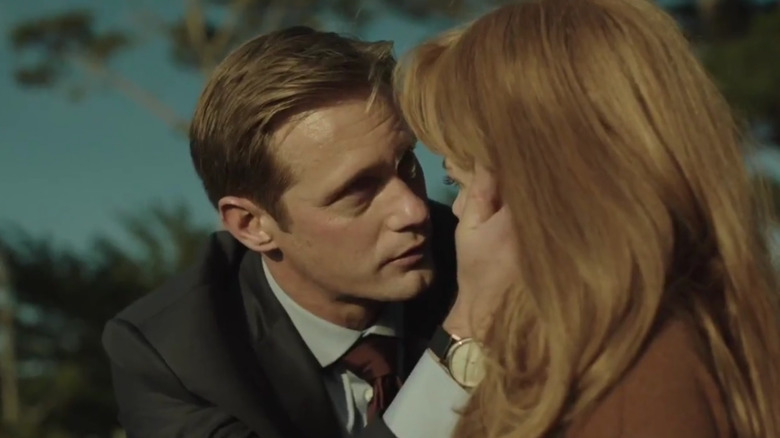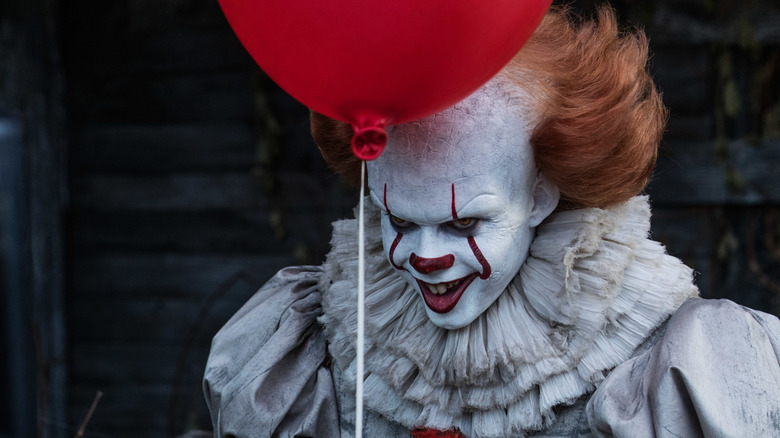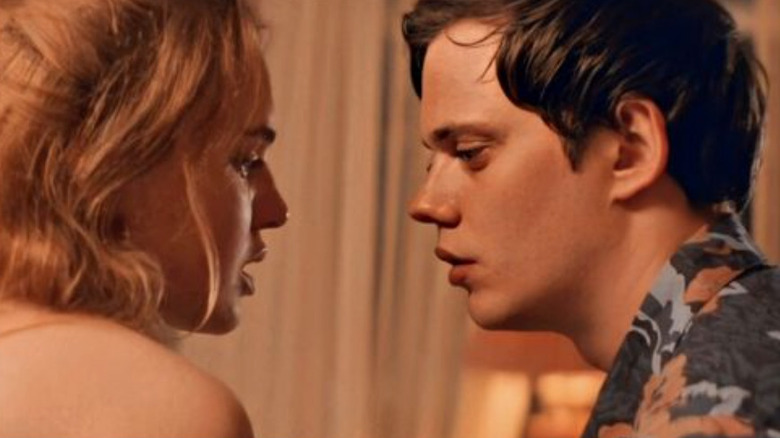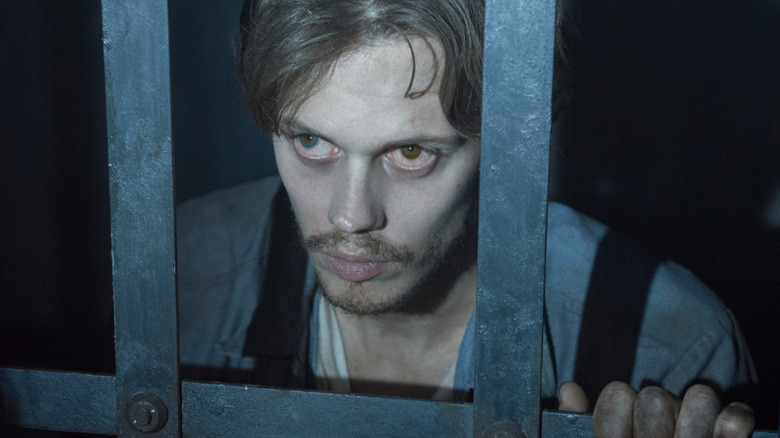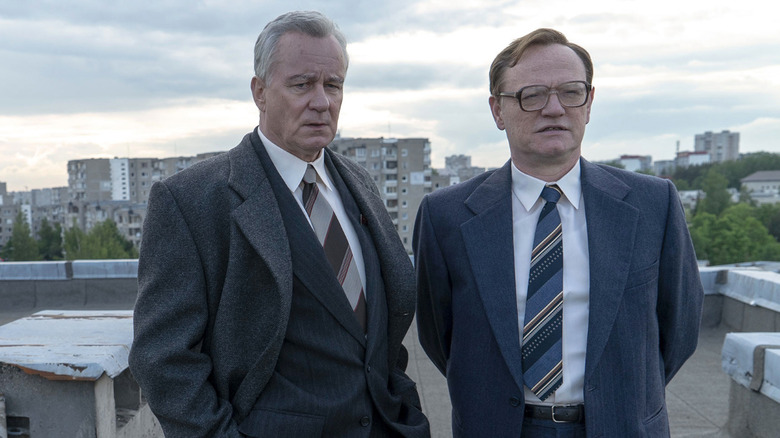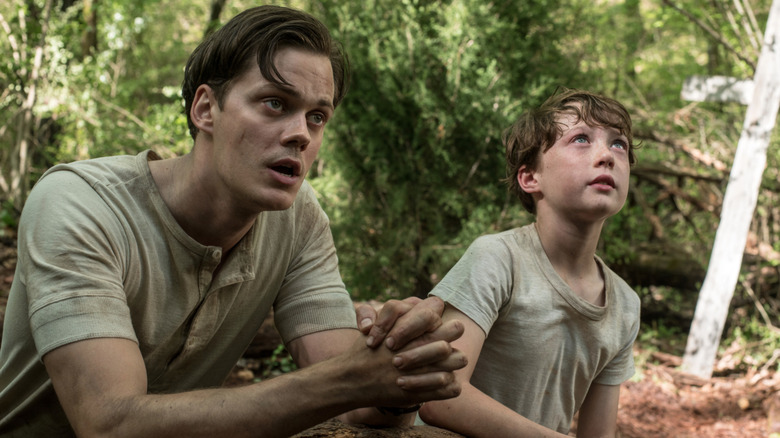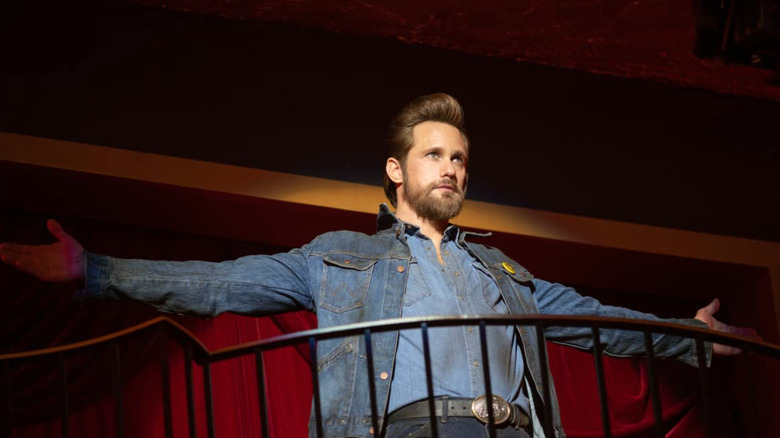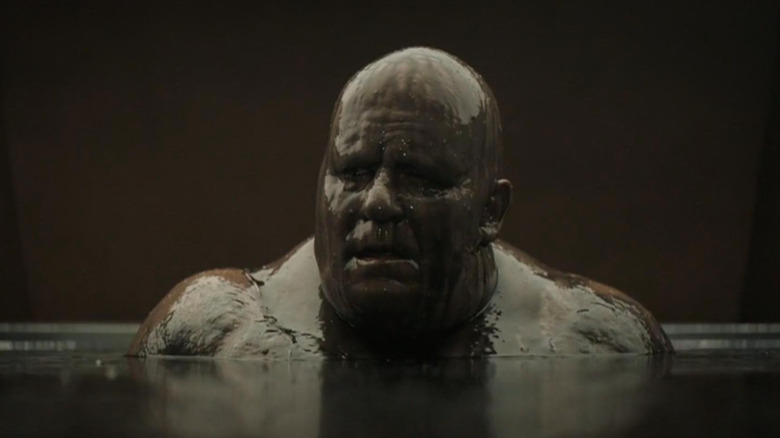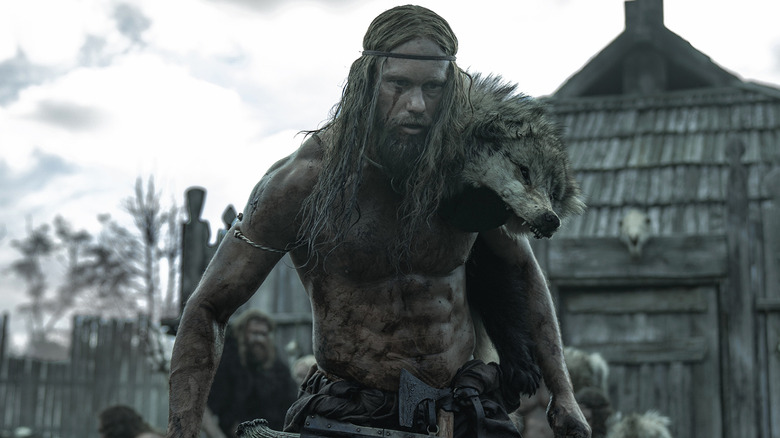17 Times The Skarsgårds Gave Us Nightmares
When Bill Skarsgård was asked what his father put in the water of his household to produce a family of talented actors, he jokingly answered, "Just a lot of alcohol." It's a fair question given the level of acting talent contained in the Stockholm family. Family patriarch Stellan Skarsgård has well over 100 IMDb credits to his name and is arguably at the peak of his career after starring in 2021's sci-fi epic "Dune." But along with this impressive resume, Skarsgård is also the father of eight children, four of them being actors. The oldest sibling, Alexander, and the fourth son, Bill, have both become A-list stars helming blockbuster hits of their own. The second sibling, Gustaf, starred in the History Channel series "Vikings" and Season 2 of HBO's "Westworld," while the fifth son, Valter, is making a name for himself in Sweden, where his more famous family members got their start before breaking into Hollywood.
While the senior Skarsgård's credits run the gamut of film genres, including singing and dancing in 2008's "Mamma Mia," he particularly likes to choose shocking roles that explore the darker edges of humanity. In an interview promoting his controversial film "The Painted Bird," Skarsgård noted, "I like material that approaches dangerous borders." His sons, Alexander and Bill, are following in his footsteps, making a name for themselves with surprising roles in the horror genre. The following is a roundup of 17 times the Skarsgård family gave everyone nightmares.
Deep Blue Sea (1999)
The movie about super-intelligent sharks sounds so ridiculous on paper that it shouldn't work. But thanks to director Renny Harlin's steady hand and a slew of fantastic character actors, the film sits in the upper echelons of the uber-niche shark horror subgenre. Stellan Skarsgård plays Jim Whitlock, a scientist in a floating lab in the middle of the ocean searching for a cure for Alzheimer's disease by genetically altering the brains of three great white sharks. Unfortunately, he and fellow researcher Dr. Susan McAlester have inadvertently created incredibly smart killing machines. The sharks sabotage an important experiment and eventually flood the facility hoping to escape into the deep blue sea where they will reign as super predators. The film is a fantastic example of '90s horror, right down to a final credits rap by LL Cool J, transcending its sillier elements by completely committing to the premise.
Skarsgård's on-screen demise is disturbing and provides the catalyst for the film's second act. While conducting an experiment, Whitlock moves a little too close to what he believes is a sleeping shark only for it to awaken and bite off his arm. Adding insult to injury, the sharks attack the helicopter attempting to airlift him to a hospital and hurl his body, still strapped to a gurney, into the lab's protective glass. Skarsgård named this as his favorite on-screen death, and it's difficult to disagree.
The Glass House (2001)
Reports indicate that Stellan Skarsgård is an extremely supportive dad, but he plays an entirely different kind of father figure in "The Glass House," a psychological thriller about godparents from hell. Ruby is a teenager when she and her younger brother Rhett go to live with Terry Glass and his wife Erin after their parents are killed in a car accident. Though the house is luxurious, Terry has an unsettling demeanor, and his interactions with Ruby range from inappropriate to downright scary.
The film itself is a masterclass in gaslighting and emotional manipulation as Terry subtly shames Ruby for feeling uncomfortable around him and causes her to blame herself for her parents' death. Skarsgård's cold Scandinavian demeanor provides an element of unnerving ambiguity leaving the audience unsure where Terry's motives lie. This coldness is brought to shocking life in a creepy scene early on in the film. Having been deeply traumatized by videos of graphic car crashes in her driver's ed class, Ruby is clearly shaken at dinner. Terry responds by taking her on an erratic drive through the dark neighborhood. Once the car has spun off the road, he leans over as if to kiss her. When she warns him away, he gently reaches over her shoulder and notes that she doesn't have her seat belt on. Though "The Glass House" is largely a boilerplate psychological thriller, Skarsgård manages to create a disturbing and memorable villain.
Exorcist: The Beginning (2004) and Dominion (2005)
Under ordinary circumstances, stepping into one of the most famous roles in all of horror cinema would be a dream come true for any actor. But trouble plagued the production of the prequel to William Friedkin's "The Exorcist" creating a sort of nightmare scenario of its own. Stellan Skarsgård plays the iconic Father Lankester Merrin years before he would stand under that famous Georgetown streetlight in preparation for battle against the demon Pazuzu. Signing on to play a younger version of Swedish actor Max von Sydow, Skarsgård approached his character's arc less as a horror story and more as a drama about a man struggling with his faith.
After viewing director Paul Schrader's finished film, studio executives decided it wasn't scary enough and decided to reshoot the entire thing with a few significant differences. Shelving the original, they began work on a new version, recycling many of the same sets, costumes, and plots. Director Renny Harlin stepped in to make a more ostensibly horrific film out of the valuable IP, but "Exorcist: The Beginning" was poorly received by audiences. Hoping to recoup some of its investment, studios then released the finished copy of the first directorial effort, "Dominion: Prequel to The Exorcist," directly to DVD. Though the original version fared marginally better among viewers, the parallel films stand now as an example of studio interference rather than effective horror movies.
True Blood (2008-2014)
The oldest son of the Skarsgård clan never intended to go into acting. After working as a child actor in Sweden, Alexander Skarsgård initially felt uncomfortable in the public eye and walked away from the profession at 13. He spent the next decade exploring other options, even enlisting in the Swedish armed forces before auditioning for "Zoolander" on a whim. His breakout role arrived seven years later as Eric Northman on the hit HBO series "True Blood." The brooding vampire is Sheriff of Area 5 and owner of Fangtasia, a vampire bar where Bon Temps waitress Sookie Stackhouse goes on a first date with civil war era vampire Bill Compton. The role is extreme in almost every sense of the word, and the primetime vampire soap opera quickly became known for its graphic sexual content and violence.
Eric is such a compelling character because we're never sure exactly where his intentions lie. This is largely due to Skarsgård's constant exploration of the vampire's inner complexity. Falling somewhere between villain and anti-hero, Eric shows emotional vulnerability as the show progresses, but it's difficult to ever fully trust him. What's not in question is his involvement in some of the show's most shocking moments, from bursting into flames while sunbathing naked in the snow, to exacting a brutal revenge 2,000 years in the making.
The Girl with the Dragon Tattoo (2011)
It takes a lot to stand out in a film as thematically dark as David Fincher's "The Girl with the Dragon Tattoo," but Stellan Skarsgård manages to do just that with a five-minute monologue in the film's final act. Skarsgård plays Martin Vanger, the brother of a missing girl whom disgraced journalist Mikael Blomkvist and researcher Lisbeth Salander have been tasked with finding. The Swedish actor was drawn to the project out of a desire to work with Fincher and signed on before reading Stieg Larsson's posthumous best-selling novel from which the film is adapted.
While conducting their investigation on his family's estate, Mikael and Lisbeth discover that while Martin may not be responsible for his sister's death, he is a sociopathic serial killer who learned the trade at his father's knee. He explains himself while calmly sipping a drink from the couch of his elaborate kill room while Mikael is dangling from a neck harness and shackles in front of a camera poised to record his gruesome demise. The wall is lined with industrial cleaning supplies and power tools, ominous signs of the atrocities that have taken place here. But perhaps most chilling is his icy delivery of this terrifying line: "We're not that different, you and I. We both have urges, satisfying mine requires more towels."
Straw Dogs (2011)
Alexander Skarsgård booked one of his first major film roles as Charlie in Rod Lurie's remake of the 1971 revenge film "Straw Dogs." Sam Peckinpah's original is a shocking examination of masculinity and a commentary on cinematic violence, themes Lurie attempts to expand upon in his updated version. Lurie's film changes the location to the American rural south and depicts Charlie as a former high school football star now managing a construction crew in his hometown. His ex-girlfriend Amy, now an actress, returns to town with her screenwriter husband, David. Enraged by their happiness, Charlie brutally assaults her. The film concludes with David and Amy finding justice in shocking acts of violence.
Though it would be easy to dismiss Charlie as a sadistic rapist, Skarsgård makes the character even more terrifying by attempting to empathize with him: "I wanted him to be more three-dimensional and understand who he was 10 years ago, the dreams and ambition—what he has lost." He described the relationship as a love triangle between Charlie, Amy, and David. While that's not exactly how the camera views this reunion, it is likely how a wounded narcissist like Charlie would see Amy's return. This empathy is effective not because it excuses Charlie for any of his horrific actions but because it presents him as a real monster people may actually encounter rather than a cut and dry villain with shallow motives.
Hemlock Grove (2013-2015)
Not to be outdone by his older brother, Bill Skarsgård also made a name for himself playing a vampire. Skarsgård booked his first major role in the U.S. as Roman, the only son of the wealthy Godfrey family who looms over the small town of Hemlock Grove. Part human and part Upir, a form of Ukrainian vampire, Roman has a volatile and occasionally Oedipal relationship with his mother Olivia. Adapted from the novel by Brian McGreevy, the show also takes inspiration from Twin Peaks. Season 1 sees Roman befriend a Romani werewolf named Peter in order to solve a series of brutal murders throughout the small town. The two become close friends over the course of the series, sensing that the other will uniquely understand their supernatural ancestry.
Though Roman Godfrey and Eric Northman have numerous differences, the two vampires do share a common complexity and it's difficult to pin either down as a hero or a villain. Roman frequently gives in to his carnal desires and bloodlust, providing some of the show's bloodier moments, a high bar considering the involvement of gore aficionado Eli Roth. "Hemlock Grove" debuted in the early days of Netflix streaming, and though it never reached the popularity of "True Blood," the role set the younger Skarsgård on the path of high-profile horror roles for which he would come to be known.
Hidden (2015)
Known for his handsome features, Alexander Skarsgård plays a much less glamorous character in the 2015 film "Hidden." Roy lives with his wife and young daughter in a bomb shelter hiding from mysterious creatures known as Breathers. After 301 days of isolation, the family discovers that a rat has gotten into their food supply, inviting questions about the integrity of their hiding place. The search for this rat leads to a chain of events that forces them to leave their shelter, setting up a devastating battle for survival and a horrific revelation. Skarsgård's Roy is scruffy and emaciated, having lived in darkness for nearly a year subsisting only on rations of canned food. This dressed-down role allows the talented actor to explore his more sensitive side; his relationship with his daughter is the emotional core of the film.
Though "Hidden" didn't make much of an impact and still remains largely unknown, its ripple effects throughout pop culture have been seismic. The film was written and directed by Matt and Ross Duffer, now known as the Duffer Brothers and the creators of the Netflix phenomenon "Stranger Things." Thematic connections to the 1980s sci-fi horror series abound featuring malevolent government agencies and monsters both human and otherworldly. The black-veined creature design in "Hidden" is similar to Billy's transformation in Season 3, and Roy can be seen as a sort of prototype for Jim Hopper, a father who will do anything to protect his family.
Big Little Lies (2017-2019)
Playing an entirely different kind of monster, Alexander Skarsgård stars alongside Nicole Kidman as Perry and Celeste Wright in HBO's "Big Little Lies." The ostensibly happy couple live a life of luxury and passion in their beachside house with their twin boys Josh and Max. But the glamorous lifestyle hides a dark and frequently violent relationship, and Perry's secret life is a catalyst for another of the show's more shocking elements. Like his character in "Straw Dogs," it's Skarsgård's ability to humanize Perry that makes him all the more terrifying. "On the surface, he's an alpha — but deep down, he's insecure and spends his life waiting for the moment when she [Celeste] leaves him," the actor explained to IndieWire.
Kidman and Skarsgård worked hard to create the kind of trust that would allow them to film such a complicated relationship, often improvising many of the couple's violent fights. Both actors won Emmys for their authentic depiction of an abusive relationship, and Kidman reportedly received many emails from people responding to the show with a new understanding of the complexities involved in loving someone who hurts you. The role catapulted Skarsgård to a new level of fame and added depth to his growing resume.
If you or someone you know is dealing with domestic abuse, you can call the National Domestic Violence Hotline at 1−800−799−7233. You can also find more information, resources, and support at their website.
It (2017) and It Chapter Two (2019)
The announcement of a new adaptation of Stephen King's epic novel, "It," was met with a great deal of excitement. But Constant Readers also expressed a heavy amount of skepticism about who would fill the floppy shoes of Tim Curry, whose iconic performance as Pennywise the Dancing Clown elevated the 1990 miniseries adaptation into a cultural phenomenon. After a tumultuous pre-production, director Andy Muschietti cast Bill Skarsgård as the titular clown, reinterpreting the character with a more classical look and leaning into his shapeshifting abilities. The adaptation was a huge success, and the first of the two-part series remains the highest-grossing horror movie of all time. Though the sequel, "It Chapter Two," did not overtake its predecessor, the film was still massively successful and currently ranks at number four on the same list.
Though Muschietti employs CGI in many of the movie's special effects, most of Pennywise's devilish look is all Skarsgård. The Swedish actor reportedly spent weeks developing his Pennywise voice and unnerved co-star Bill Hader with the ability to move his eyes independently. The iconic smile is based on a childhood ability to point his lower lip, learned from older brother Gustaf. Though the original novel is known for ushering in a wave of coulrophobia, Muschietti's new adaptation ironically coincided with a real-life clown panic throughout the U.S.
Assassination Nation (2018)
In another all-too-human monster, Bill Skarsgård plays Mark in the ultra-violent horror film "Assassination Nation." Lily is a high school senior having an affair with a much older man named Nick while maintaining a stormy relationship with her high school boyfriend, Mark. A massive data leak exposes the secrets of half the town and publicizes the trove of anonymous nudes she's been sending Nick, putting her life in danger. The shocking film is an unflinching examination of social media culture, toxic masculinity, and female rage listing a slew of trigger warnings in its opening moments.
Though Skarsgård does not play the film's central villain, his role is arguably more haunting as an example of the dangerous results of growing up in a toxic alpha-male culture. Mark is an insecure young man who takes his frustrations out on his girlfriend, in one scene berating Lily for her revealing attire. One of the film's most upsetting scenes involves Mark soothing his bruised ego after finding out about her infidelity. Having recognized Lily's body in the nudes she sent to Nick, he and several friends ambush her in the school locker room, holding her down and searching her body for an identifying birthmark that will reveal her to be the source of the photos.
If you or someone you know is dealing with domestic abuse, you can call the National Domestic Violence Hotline at 1−800−799−7233. You can also find more information, resources, and support at their website.
Castle Rock (2018-2019)
In 2018, Bill Skarsgård returned to the world of Stephen King in the highly anticipated "Castle Rock." From executive producer J.J. Abrams, the anthology series is an IP playground of sorts set in King's iconic town with many characters from his canon interacting with original characters in new storylines. Skarsgård plays the mysterious Kid, a mostly silent prisoner found deep within the walls of Shawshank State Prison. Skarsgård's Kid is an original character, but his name is perhaps a nod to a controversial character in the extended cut of King's epic novel, "The Stand." Though we never find out exactly where he comes from or what he's doing in his solitary cell, the Kid seems to possess the ability to inspire dark desires and instincts in anyone who goes near him.
Having just wrapped filming on the adaptation of King's masterpiece "It," Skarsgård was understandably hesitant to commit to another role related to the prolific author. He was reportedly won over by the material itself and enjoyed the ability to create a new character whose storyline was not already known to audiences. In fact, after two seasons, we're still not sure who The Kid is and what his presence in Castle Rock means for King's Macroverse.
Chernobyl (2019)
Airing 33 years after the real-life disaster it portrays, HBO's "Chernobyl" became a massive hit and earned wide praise for its authenticity and attention to detail. Craig Mazan's five-part series is the story of the 1986 explosion of reactor four at the Chernobyl Nuclear Power Plant in Soviet Russia. Stellan Skarsgård stars as Boris Shcherbina, the soviet bureaucrat charged with managing the aftermath of the disaster. Skarsgård won high praise for the role, taking home a Golden Globe for best supporting actor in a television series. When speaking of his character's arc, the Swedish actor noted, "It's interesting to play a character who is representative of a faulty system, and has spent his life defending it, and then has to look back at his life and admit that he's been wrong."
Though "Chernobyl" is more drama than horror, the story's verisimilitude often makes for horrific viewing. In addition to the gruesome makeup effects used to depict the horrors of radiation poisoning, Skarsgård is involved in one of the show's most unnerving moments when Shcherbina commands a pilot to fly directly over the open and burning reactor only to be averted by his partner Valery Legasov's desperate pleas. The scene gains new significance as the two men later watch from a nearby rooftop as another helicopter attempts the same flight and disintegrates in midair due to the massive amount of radiation. Based on horrifying true events, "Chernobyl" grows more harrowing with each rewatch.
The Devil All the Time (2020)
In a bit of a departure for the Swedish actor, Bill Skarsgård plays Willard, a father in the rural south in Antonio Campos' sprawling southern gothic "The Devil All the Time." The multi-generation story begins as Willard returns from service in the South Pacific and starts a family, only to find that his demons have followed him home. He teaches his young son, Arvin, a deadly combination of religion, violence, and sacrifice that serves as the catalyst for much of the story's broad reach. Willard's scenes are some of the film's most frightening, and his depiction of a father struggling with PTSD won praise from critics amidst mixed reactions to the movie in general. Though the Netflix film features an impressive cast, many critics felt it was simply overstuffed with characters and plot.
Skarsgård was initially intimidated by the role, wary of his ability to shed his nordic demeanor to embody the father from 1950s era West Virginia. Though the film is arguably more of a drama than horror, Skarsgård embraced the more terrifying elements of the story, calling it an exploration of "what desperate people do in order to try to save themselves and their loved ones." On set, the Stephen King veteran reportedly leaned on his horror roots by revealing to Michael Banks Repeta, the young actor playing his son, that he is in fact the actor who portrayed Pennywise in "It," bringing the boy to tears during an emotional scene.
If you or someone you know is struggling with mental health, please contact the Crisis Text Line by texting HOME to 741741, call the National Alliance on Mental Illness helpline at 1-800-950-NAMI (6264), or visit the National Institute of Mental Health website.
The Stand (2020-2021)
Bill Skarsgård is not the only family member to play an iconic villain from Stephen King's connected universe. Older brother Alexander Skarsgård entered the master of horror's world by portraying the equally evil Randal Flagg, the central villain in King's "The Stand" and a handful of other stories. The 1,152-page novel is the sprawling story of an America ravaged by a plague that wipes out 99% of the world's population. The survivors find themselves drawn into an epic battle between good and evil that may decide the future of humanity. Ironically "The Stand" wrapped production in March of 2020, just days before most of the world went into lockdown as a result of COVID-19. The nine-part miniseries debuted in December 2022, a fitting and poignant cap to a year turned upside down by a deadly disease.
A devil of sorts, Flagg is a suave and often charming villain, able to talk his victims into following him with the promise of power. But he can be vicious as well as the unfortunate Bobby Terry discovers after failing to follow his boss' instructions. Flagg emerges from a Las Vegas elevator covered in Bobby's blood and clutching what appears to be the doomed man's heart in his fist. When asked who would win in a fight between Bill's Pennywise or Alexander's Flagg, the actor was a bit biased in saying he thinks Flagg would win, given his devilish powers.
Dune (2021)
Not to be outdone by his children, Stellan Skarsgård also plays a villain in a blockbuster adaptation of an epic series of novels. "Dune," adapted from Frank Herbert's classic novel, features Skarsgård as the sinister Baron Vladimir Harkonnen. The ambitious film debuted in 2021 to generally positive reviews and a slew of Academy Award nominations including Best Picture. The film features an all-star cast including Timothée Chalamet, Oscar Isaac, Zendaya, and Rebecca Ferguson bringing the beloved source material to life. Skarsgård is terrifying as the sinister Baron, who murders Duke Leto Atreides and abandons his heir, Paul, and concubine Lady Jessica to be devoured by the cruel deserts of Arrakis.
Transforming into the 600-pound villain took nearly seven hours in the makeup chair, but underneath the numerous prosthetics and built-in cooling system is the trademark gravelly voice and cold demeanor that has proved so terrifying in Skarsgård's other films. Especially chilling is the scene from which he emerges from a vat of black goo, inspired by Marlon Brando's iconic Kurtz from "Apocalypse Now." Skarsgård intentionally resisted humanizing the larger-than-life villain, wisely choosing to use his limited screen time to "scare the s***" out of audiences.
The Northman (2022)
Alexander Skarsgård's film "The Northman" is a passion project stemming from his time as another Northman, Sheriff Eric in HBO's "True Blood." Skarsgård became fascinated with Viking lore while filming Eric's origin story and began sketching out plans to bring Nordic mythology to the big screen. Based on the Viking myth that inspired "Hamlet," "The Northman" is the story of Amleth, a Viking prince cast out of his ancestral lands who spends the rest of his life dedicated to revenge against the man who murdered his father and kidnapped his mother. "The Northman" afforded Skarsgård the opportunity to reunite with Nicole Kidman who plays his mother Queen Gudrún. The two again share a tumultuous relationship in some of the film's most intense scenes.
Skarsgård sought out director Robert Eggers after his debut film, "The Witch," impressed the Swedish actor not only with the meticulous director's attention to physical detail, but in his ability to invite audiences into the psychology of his films' time periods. This authenticity is not just relegated to the film's sets; Skarsgård underwent an enormous physical transformation to embody the muscular warrior. Though we sympathize with Amleth, the laws of ethics have little place in the violent world of Norse mythology. Skarsgård intentionally resisted glorifying this violent heritage, depicting a savage raid in which Amleth and his fellow Vikings lay waste to a peaceful town in order to claim the spoils of battle.
If you or anyone you know has been a victim of sexual assault, help is available. Visit the RAINN website or contact RAINN's National Helpline at 1-800-656-HOPE (4673).
